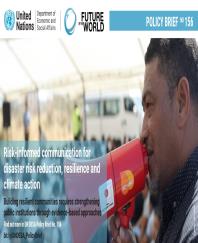Policy Briefs
UN DESA Policy Brief No. 156 Enhancing Public Institutions' Risk-informed Communication to address Multifaceted Crises for Disaster Risk Reduction, Resilience and Climate Action
January 08, 2024

UN DESA Policy Brief No. 156: Enhancing Public Institutions’ Risk-informed Communication to address Multifaceted Crises for Disaster Risk Reduction, Resilience and Climate Action
Key Messages
- Effective risk-informed communication is a critical component of multifaceted crises management and should be incorporated into policy and practice at all levels of government and society to effectively handle complex crises, reduce the risk of disasters, and combat climate change.
- In an era of rapid proliferation of mis- and disinformation, it is increasingly crucial to ensure that people have access to accurate and reliable information to help them prepare for, respond to, and recover from disasters.
- Emerging risks and global crises, such as the intensifying impacts of climate change and global pandemics, have heightened the need for strengthened risk-informed communication in public institutions in order to mitigate their impacts.
- Building resilient communities for sustainable development requires media organizations to play a central role in promoting public awareness and advocating for evidence-based approaches to risk-informed communication, disaster risk reduction, and climate action.
- Warning dissemination and communication should be seen as the third pillar of every executive action plan in order to promote early warning for all.


